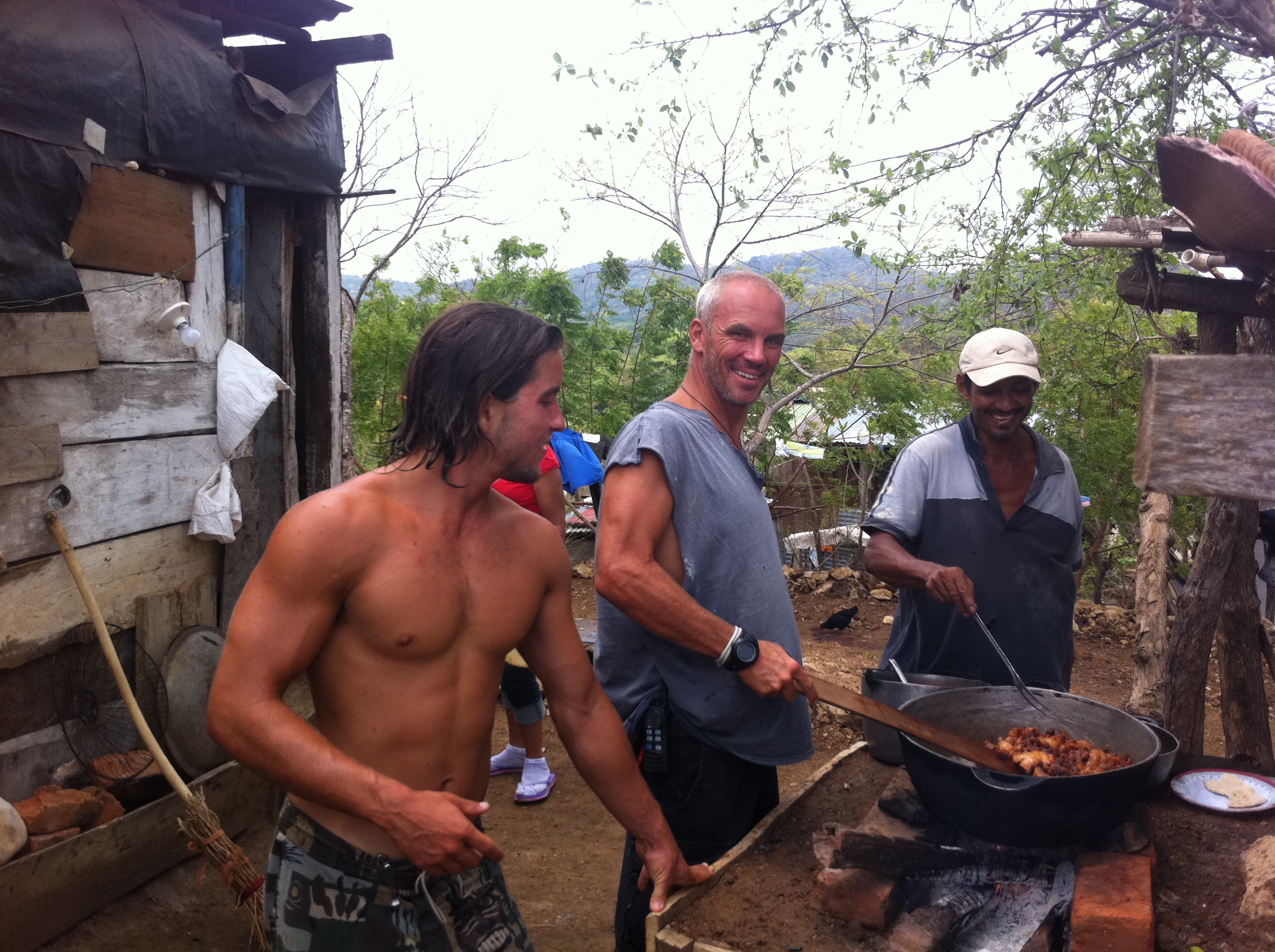
On Cinco de Mayo, 2011, the wind blew us south, out of that great Golgotha named Mexico. Behind us, as if in flatulence, we left the cactuses, guitars, guns, lucheros, and tequila. My wife and I wanted a calmer land, a place she could give birth, some place to drop anchor for a few months, someplace to cool our nerves, to repair the rips in the sails, and to calm our minds.
PART ONE: THE DEPARTURE FROM MEXICO.
Sailing is not an easy life. Important tasks float, constantly, in front of you, and if you are working (as in for-the-man as opposed to for-the-boat) at the same time it can be spirit-breaking. It takes me, for example, an average of 15 minutes to track down a gallon of water and another to bring it back. That's an average from the last few years. If you had to spend 15 minutes for each gallon you used you'd wash your dishes in salt water and feel fine about fewer showers. Desert nomads, we'll suck up all the water we can in a restaurant, and then, drunk aquaholics, shove a few 8-gallon garrafones in the dinghy and row them back to the boat. This bullshit myth of Jimmy Buffet and Margaritaville has been a tarnish upon my pusser's badge. The idea that living on a boat amounts to sitting around in a hammock all the time is utter drek. In fact, I can think of nothing further from the truth. I will digress further for a moment to point out that tales of sailing are of two extremes; the high-seas-and-heavy-spray-demasting, or the bikini-on-the-foredeck-with-a-maiThai. Neither of these Death or Decadence myths are real, because both are exceptional. There are moments – in my case brief moments – when the bikini blondes are littering the deck of my boat, and there have been times the boat has been knocked down. But they were rare. Most of life aboard is turning a wrench, dipping a brush, breaking a toe, and then gleefully jumping off the foredeck into crystal clear warmth at sunset.
Anyway we were feeling a little fragile, in love as we were, and ripe for reproduction (which I will write about some other day since I have not yet figured out how babies and pirates will live in the same essay). I wanted to leave the warzones, for a change. The whole fucking world's full of people arguing about what happens after we die, then killing each other over it, or over a piece of dirt, or . . . and all I wanted was a simple bay where I could anchor and concentrate on improving our boat. Some might call it nesting, but it was more like digging in. Having a kid has never been something that's seemed like peacetime, and in fact I had always detested the idea, so I wanted to prepare for the storms ahead.
While surfing in Puerto Escondido (where we spent almost a month until I had snapped my board and since I never mastered three consecutive waves decided it was time to go surf elsewhere) we made friends with Colton and Coral. We brought them along, made some other new friends on the way, and we caught our own food, and ate so many good, free meals that it seemed some law was being broken. Of course the only law we were breaking was Modernity, and catching our food daily didn't earn us much money, but we didn't spend any either, and if you kill what you eat it satisfies more than your stomach, but your heart is full, too, from seeing life and death and laughing through it all.
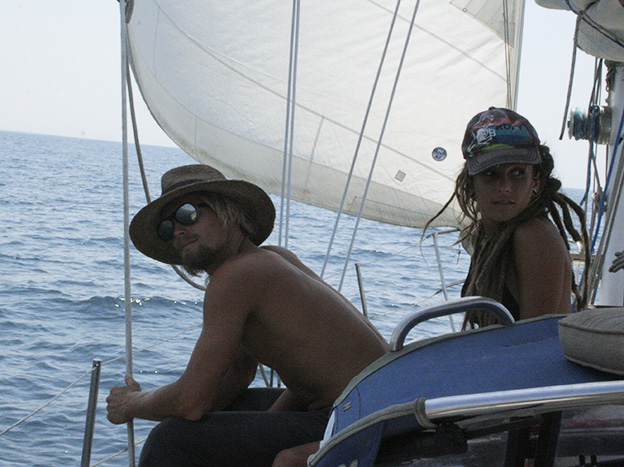
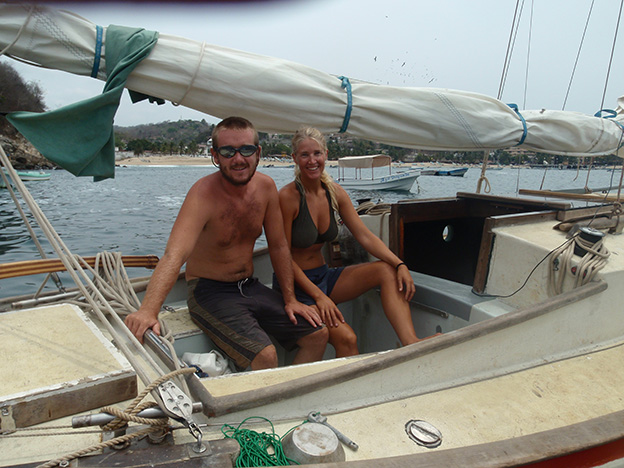


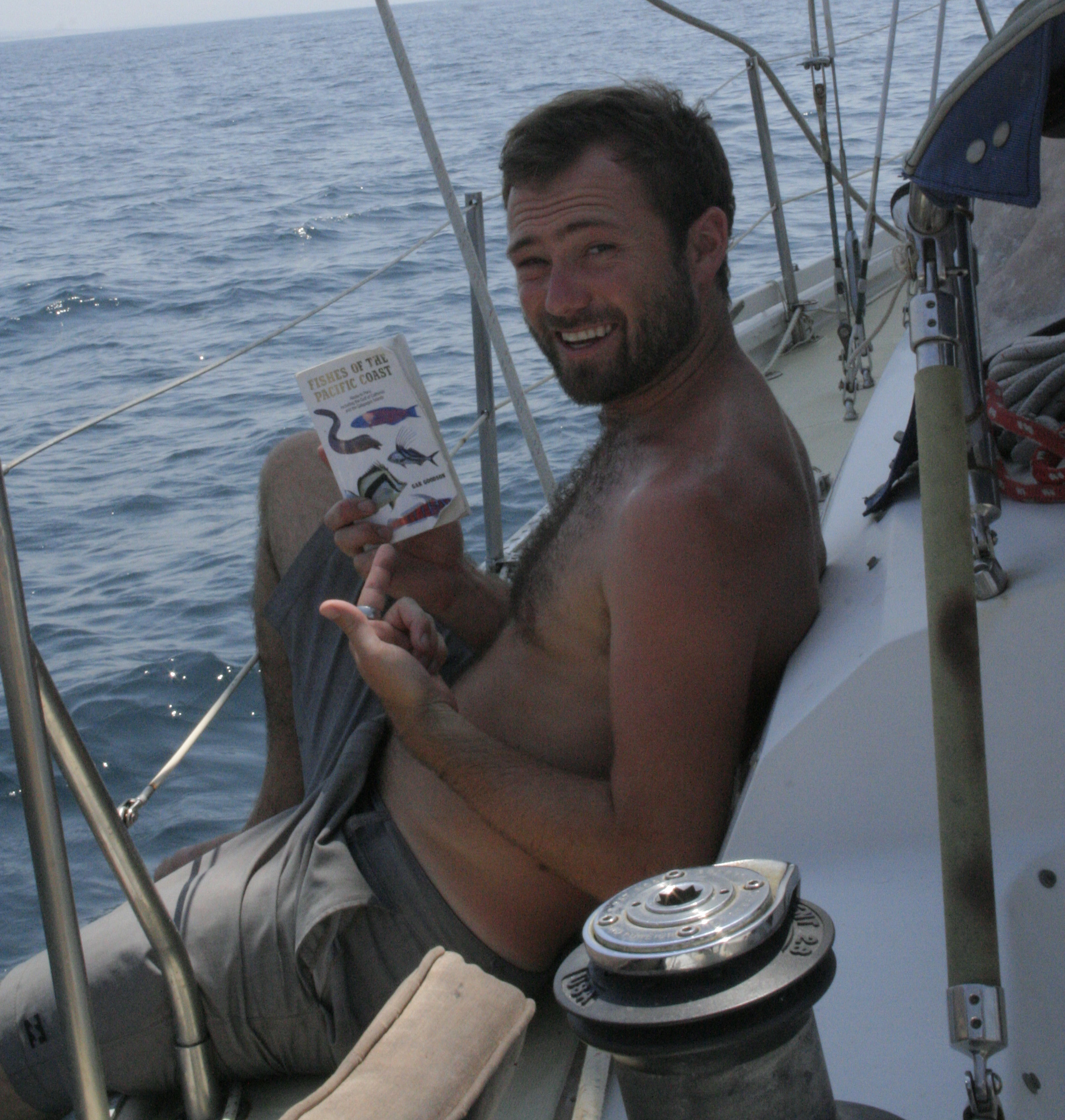
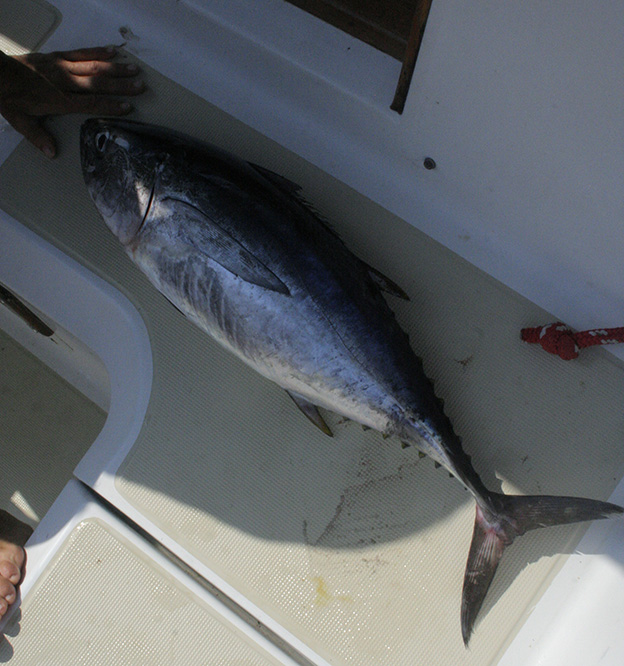
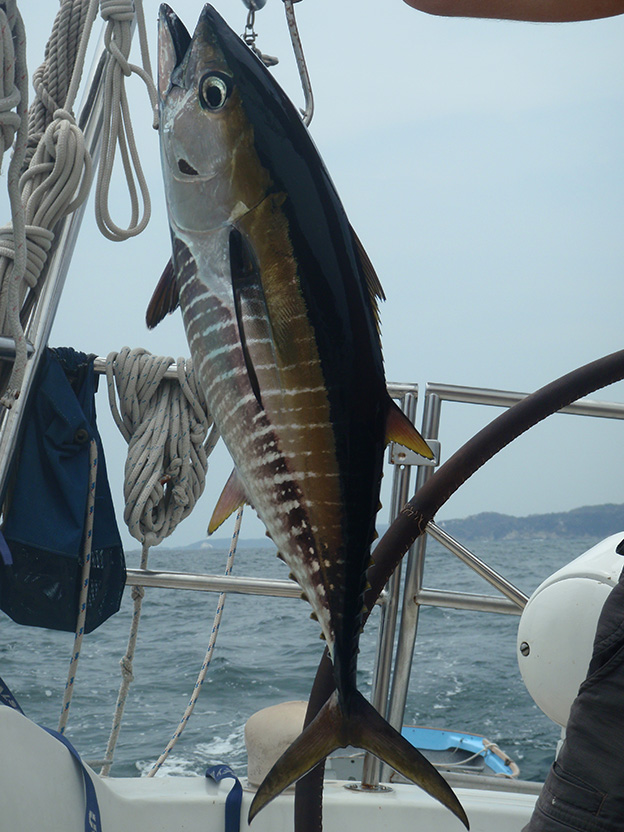
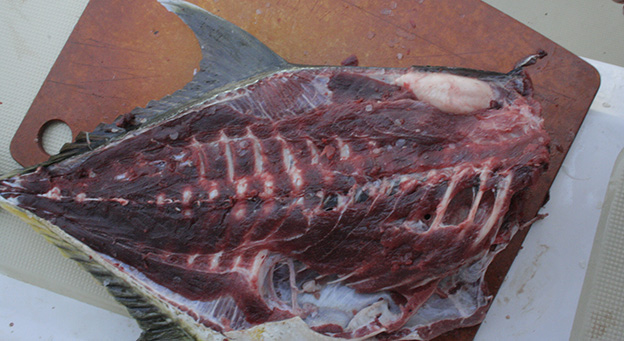



If you surf and sail, which is rare (because surfboards like waves and no wind, and sailboats are the opposite), difficult (because you need a boat and a body in good enough shape to have time and ability to surf), and financially stupid (because beach-time doesn't pay well), then I must offer the recommendation that you visit southern Mexico. I have surfed in the US, Sri Lanka, Australia, France, Portugal, and a half dozen other countries, to earn my certification to say the following: from Puerto Escondido to the north-western Tehuantepec is the prime cut of the Eastern Pacific's best flank steak. I ended up breaking boards there, as I said, and I ended up in the best shape of my life, and I ended up wanting to live there. But we left, as sailors eventually do.
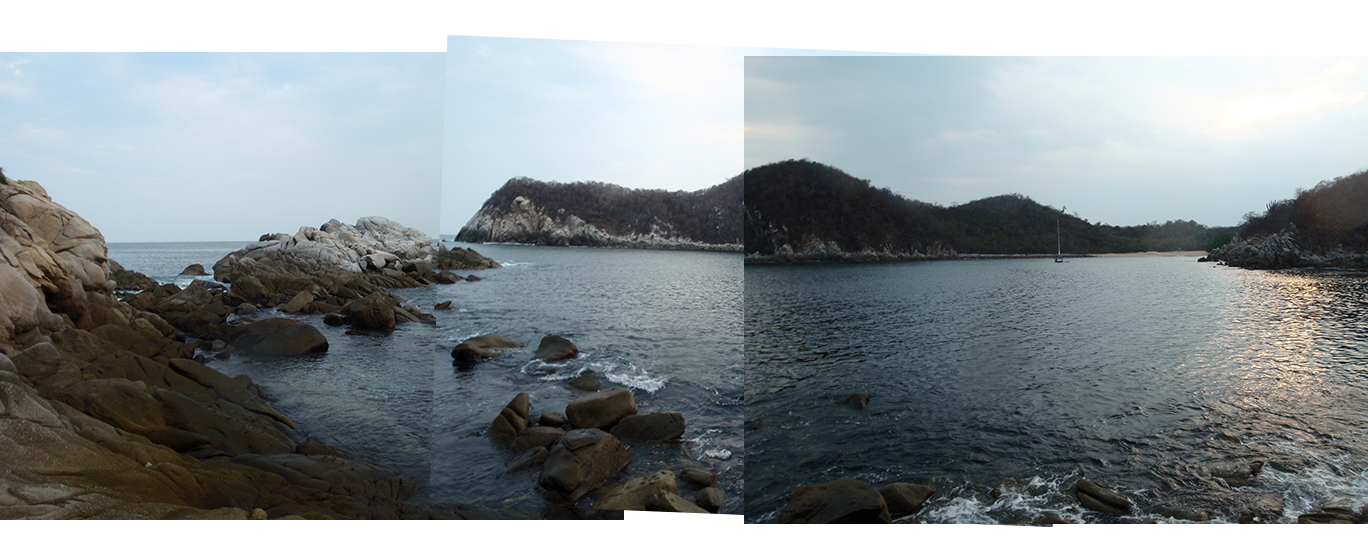


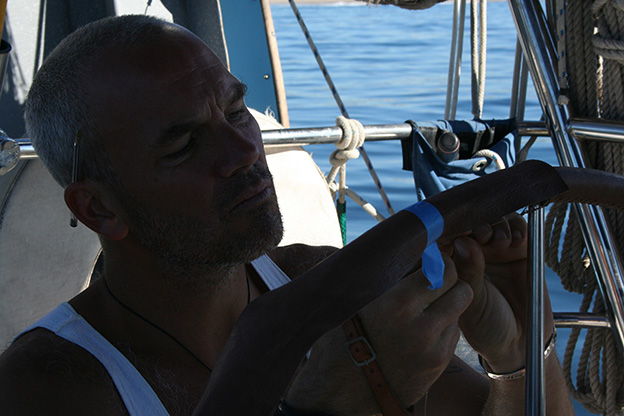
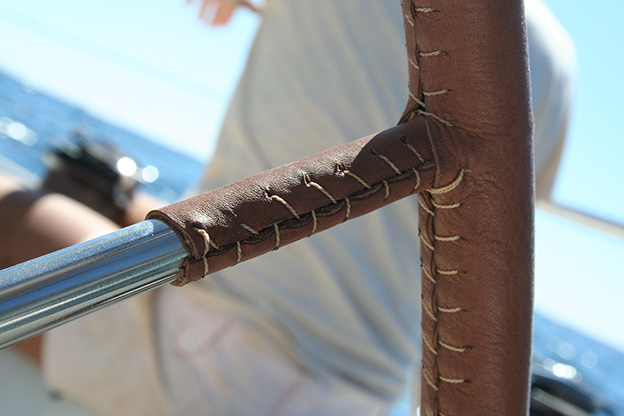
It was thusly that we pointed the Blue Goose south and pulled sail to get the fuck out of fish-guts bloody-narco plastic-bag-littered dear old Mexico. We sailed from Puerto Escondido to San Juan del Sur so with the good sloop Patience (a sloop of three surfers named Daniel, Paul, and Jacob), and with them we explored bay after bay of surf spots from Escondido on south.
Now, Guatemala ain't an option if you're poor, like us. If, on the other hand, you want to drop an anchor in some mud and lose hundreds of dollars for entry permissions, it's great. But for us there's other countries, so we blew past that coast in one bright night, fifteen miles offshore, fireflies blinking over the water and surrounding the boat as the little lights of whatever people live on those shores glistened like moored stars. I saw nothing of the country, only the lights. I can say people live there, but I did not meet them. I did not eat their food, hear their music, nor set foot on their land. We sailed through the clean warm night, a full moon above, and the next morning we passed a great bay to our left where more wars were fought, for centuries, and so (because I had my fill of war) we sailed on to El Salvador.
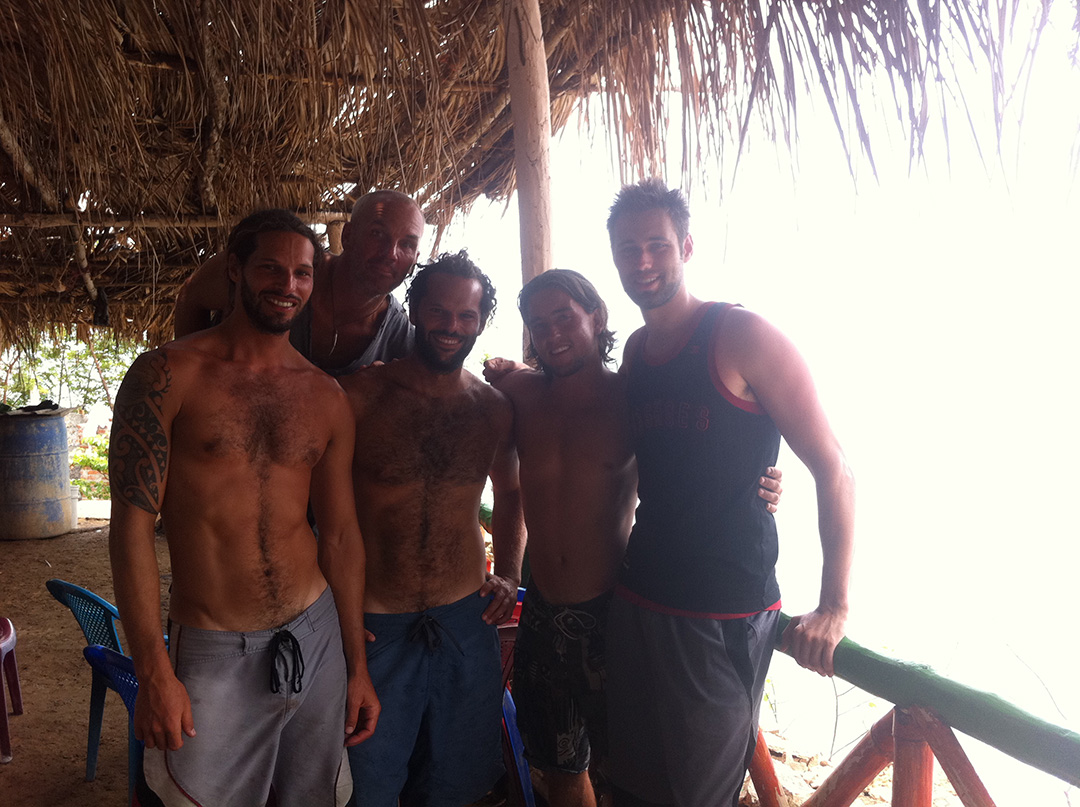
Other than molotov cocktails I come with little to relate about El Salvador.
On May 9th we wedged the two boats seven miles up a stinking emerald drain of a river named Jiquilisco, that smelled like mold and the thin green algae slime that grows on shoes left in puddles. We moored the boats in Marina Barilla. With a cracking swimming pool, moldy palapas, South Pacific themed bar, and Kenny Loggins on the radio it seemed more an under-financed country club with playboy ambitions than a place to keep a boat. The guardians obligingly welcomed us. In the week we spent there we entertained ourselves by eating papusas in Pochutla and testing molotov cocktails on the river bank.
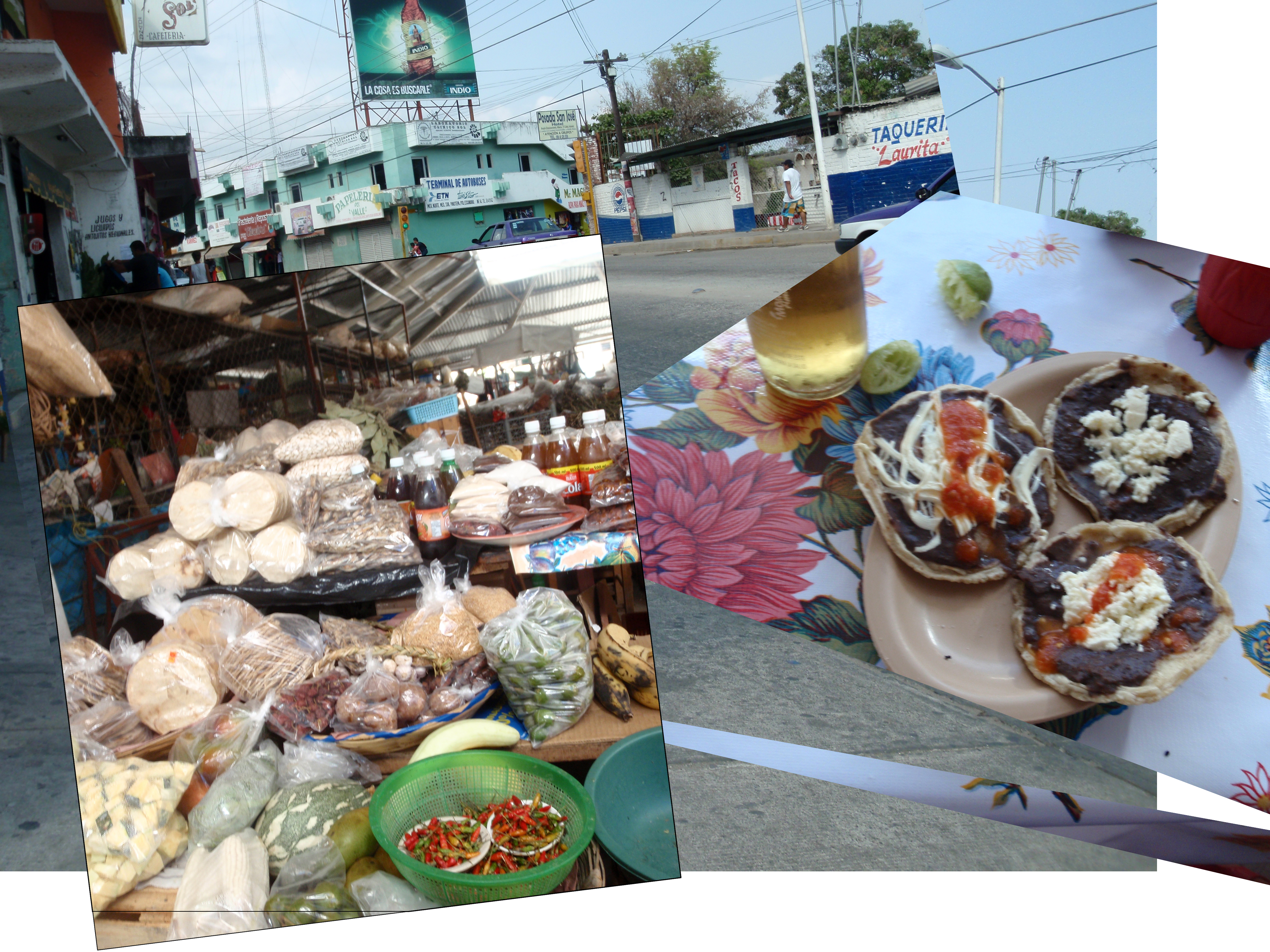
PART TWO: THE COCKTAILS.
Now, to treat of the molotov cocktails, let me mention that we do not carry pistols, automatics, semi-automatics, hand-grenades, nor rocket-launchers. That stuff's unseaworthy if not downright gay. Those weapons rust and make for awkward interactions. They take up space, they tend to mis-fire, and we don't need one more thing the oil and clean. There's enough to upkeep as it is. If Mr. Customs Official climbs aboard for an entry inspection, and you declare your weapons, he'll kindly keep them for you. If he returns them (which is unlikely) they won't be oiled or cleaned. But, on the other hand, if you do NOT declare your weapons, and Mr. Customs Official finds them, you will lose your weapons and your boat. So your choice is between illegal and unarmed. And anyway, it's not nice to be a guest and walk into someone's house with weapons. You wouldn't do it going to someone's house for dinner, and entering a port is no different.
But let us consider the most humble of maritime weaponry, the Molotov Cocktail: it is discreet (a beer bottle), it is legal (you can make it anywhere), it is inexpensive (they're made out of available junk), and you can do great damage to a nearby boat (fire at sea will make even the most leathery of knife-biters so excited he will confuse). It's the perfect anti-piracy weapon.
There are Molotov Cocktail recipes that call for styrofoam, or diesel, or olive oil, or other such superfluous crap, but the best recipe I've found, after nearly 30 trials in 4 countries, is the following:
- A glass bottle. Something that breaks pretty easy. Beer bottles are a bit too strong. Nylon. As is “women's stockings.” This stuff, soaked with gas and lit on fire, turns into slag and burns at a nice, hot temperature. Dress socks, the men's business type, or women's stockings, work great and are very easy to find. It's best to cut them up and stuff them down into the bottle before you put the gas in. Maybe only one is needed.
- Some bicycle inner-tube. Smoke. Causes. Confusion. Wedge two or three small slices of these down into the bottle with the sock. If they catch and burn, great and if they don't it's not a problem since the real weapon of these three ingredients is the gasoline. You want to fill your bottle full of confusion, and smokey burning rubber makes for such a sauce. Don't put a ton of rubber in your drink, just enough for spice. Your bottle should be less than one-quarter full.
- Gasoline. This ignites fast, splashes well, is easy to find, and works better than diesel because it burns at a higher temperature. It ignites the other two ingredients. YOU DO NOT NEED TO PUT DIESEL IN THE COCKTAIL. Diesel will increase the burn time, and that's fine if you're working with flammable admixtures you want to burn slowly. But we ain't. We want this to catch and burn as fast as possible. Fill the bottle about 3/4 full. Make two more bottles. It probably depends on how many pirates you plan on attacking. But carry at least three bottles.
The only problem with Molotov Cocktails is keeping them lit. I hope to get my hands on some hurricane matches some day soon, because they don't blow out while spinning in the wind. You can improve the recipe by taking a bundle of these matches and setting them in some kind of wax to cork the bottle. A wax-match cork, especially of a parafin-based wax as that should burn a bit. For the time being I've settled on wine bottle corks mostly because it gives me more excuses to drink wine. Wine bottles are good but a little thick, by the way.
Here are three that I've had in my propane locker for a few months.

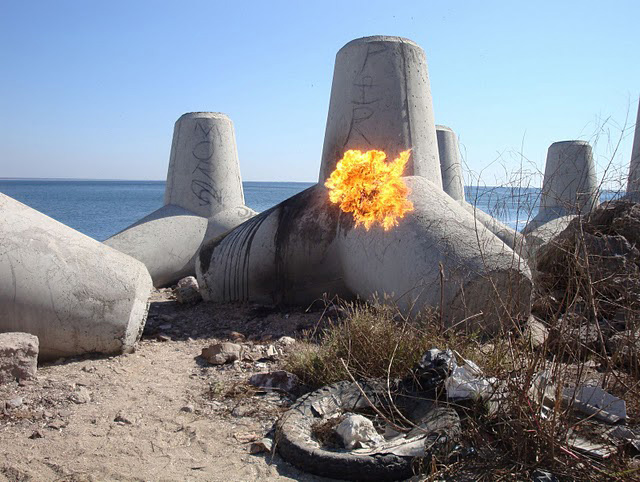


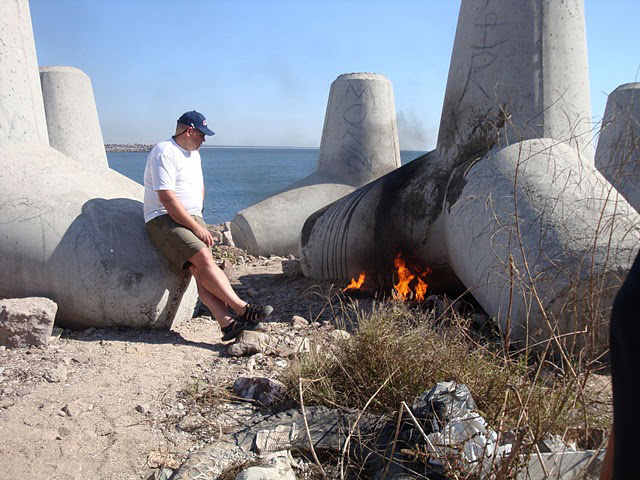
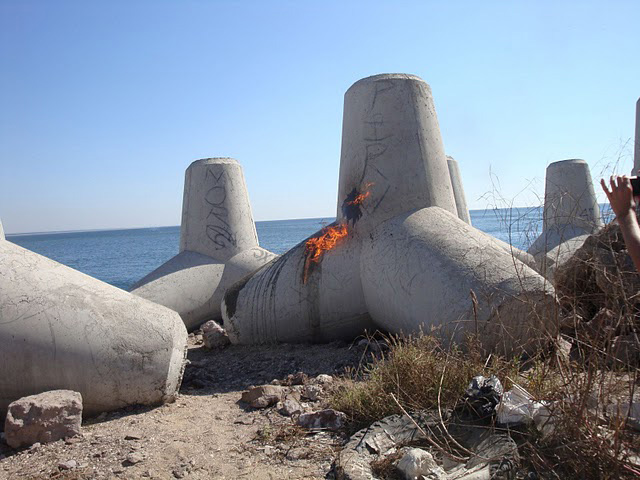
Those are photos from a previous test session, with my friends Steve and Soni, in Mazatlan, but you get the idea.
In El Salvador we nearly set the Marina Barilla on fire three times, scorched a palm tree, left some burn marks on the rocks, and spooked many animals including a bar dog that nearly got his tail torched. These were small prices to pay for perfecting our recipe. One evening I was in the marina's bar with Paul and Daniel, and we were drinking cuba libres (though we had started the afternoon with mezcal), when three waitresses simultaneously approached us. They seemed like triplets, short and fat and dressed in marina white.
“When will you be leaving,” they stated.
“The marina or the bar?”
“The marina.”
“Two more days.”
There was a good two or three seconds of silence.
Then one of them smiled with one half her mouth. It might have been the rum and mezcal combination but I think this was my invitation of departure. It might also have been an invitation to have a night of wild sex with three round-faced Salvadorean umpalumpitas. But I doubt it.
“Can I have a Cuba Libre? And a match?” I asked.
One of them went and got me the cocktail but not the matches.
Two security guards appeared at the bar and two more appeared outside the restaurant.
That was the moment when my recipe ripened, and was perfect.
The next morning we motored back out the river. The motor seemed to smoke more than I had rememebered, and I kept hearing a change in rhythm, but then decided it was my paranoia. The grey and green brack and jungle was windless save for the occasional kiskadee or red-flashing Tananger. All we could do was sit at the wheel and wipe sweat off our faces. Despite being born on the Mississippi Delta rivers make me nervous. They're contaminated drains that run, like patients run to a hospital, to the sea. And rivers are traitors to the great, healing sea because they are contagious and carry their human contamination – plastics, poop, petroleum, and umpteen other pollutions – with them. On a river you are wedged into land. There is no freedom of choice, only up or down, like paved roads. On a river, creepy and silent, all manner of dagger-toothed critters eye you, without blinking, from under the trees along the bank. And we did see crocodiles, and we had seen crocodiles, and we would continue to see the baleful beasts for many moons to come. Anyway, aquatic prejudice aside I was glad to return to open sea and pull the lines. And I caught another yellowfin that afternoon.
Three or four days later, with the good boat Patience to our beam, we made a fast stop in central Nicaragua, at Gigante. It is a small town that, like a rabbit warren being excavated by a John Deere tractor, is finding itself churned over by rather violent visitors (gringo tourists and developers). We killed a pig and skinned it and cooked it in a big pot, rendering the fat into oil, making chicharone so savory, so fresh, and so hot and spicy, that it made even the best hamburger seem like little more than a slice of celery by comparison. Here's a picture of me and Paul, from Patience, getting ready for lunch.
But after we found that we left, as sailors eventually do.
